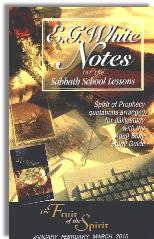|
||||||||||||||
Commentary on "The Fruit of the Spirit is Kindness"
Day 4: Tuesday, February 2, 2010
Overview
Tuesday’s lesson is about “kind words” and enumerates some particular cases of being kind to three categories of people: spiritual babies, spiritually weak, and spiritually sick. Home is presented as the first place where what we say and how we express our emotions determines how people learn to respond to the world and to God.
Observations
The weakness of the lesson is that it contains much law and little, if any, gospel. After quoting partially Ephesians 4:32, the author goes quickly to his previous theme of “treating others as God has treated us”. While it is true that Christians manifest to others God’s love toward them, it’s a mistake to assume that Christ’s mission was to be our example in forgiveness. He actually forgave us all our trespasses (Col. 2:13), cleansed us from all our sins, and, as a previous verse from Ephesians 4 tells us, we are sealed by the Holy Spirit for the day of redemption (Ephesians 4:30). The motivation for being kind is not that Christ was kind to us and offered us an example to follow, but that He actually saved us. Our redemption is sure; we are sealed, put beyond any possibility of perdition, and kept for the day of redemption—the second coming. We are exhorted to do good and to be kind because God’s grace is always and irreversibly manifested toward us. The Holy Spirit is in us, and He is producing the good works that we are exhorted to do. We are to manifest externally what the Holy Spirit works internally (Philippians 2:12, 13). While in some sense we imitate Jesus, the truth is that the Holy Spirit is the initiator, the sustainer, and the finisher of our sanctification. Kindness is His fruit, not the by-product of our imitation of God’s gracious acts.
Another negative aspect of the lesson is the unstated assumption of spiritual maturity in the readers. They are supposed to be kind toward others who are less advanced in sanctification than they are. What if the readers are spiritually sick, weak in faith, or spiritual babies? Probably, without intention, the author betrays his own denominational posture of spiritual pride generated by its adherence to the Decalogue in the form and shape it was delivered to the old covenant community of Israelites at the foot of Mount Sinai. Nevertheless, the content of today’s lesson does not give us too much in regard to Biblical content. We are left with the impression of a moralistic lesson that has nothing to do with the work of the Spirit, but rather with techniques that anybody can apply, either at work or at home, believers and unbelievers alike, methods that deal only with the attitude and behavior. There is no mention of what we are in Christ—new creations, the dawn of the age to come into the current present age, being raised with Christ in the heavenly places, or being dead to sin through Christ’s sacrifice.
Summary
- Christ’s kindness to us is not a motivator for our being kind to others.
- We are only able to be kind to others when we are saved by Christ’s blood, made alive by the Spirit and adopted into God’s family.
- Jesus is the initiator, sustainer, and empowerment of our ongoing sanctification; we do not choose to become kind or good.
- Being kind is not a moral behavior we can achieve by will-power and practice.
- Kindness is the effect of being a new creation in Christ, raised with Him in the heavenly place, and being dead to sin through His sacrifice.
- Kindness is a product of the Holy Spirit in us when He seals us for redemption when we have believed in Christ.
GO TO DAY 5
Copyright 2010 BibleStudiesForAdventists.com. All rights reserved. Revised February 1, 2010. This website is published by Life Assurance Ministries, Glendale, Arizona, USA, the publisher of Proclamation! Magazine. Contact email: BibleStudiesForAdventists@gmail.com.
The Sabbath School Bible Study Guide and the corresponding E.G. White Notes are published by Pacific Press Publishing Association, which is owned and operated by the Seventh-day Adventist church. The current quarter's editions are pictured above.
Official Adventist Resources
Standard Edition Study Guide Week 6
Teacher's Edition Study Guide Week 6
Easy Reading Edition Study Guide Week 6
Search the Complete Published Ellen G. White Writings


